Author: Bible Society, 14 February 2013
We love seeing how people respond to Scripture for the first time – so for Valentine's Day we asked Lucas Howe, a recent graduate who’d never read the Bible before, to look at some famous biblical romances and give us his first impressions of the stories...
This list is also available as an image to download.

Read the story in Genesis 2–4 now
Not feeling on the same level as the other prospective companions that God had conjured up (birds and livestock aren’t great conversationalists), Adam was in need of a woman. To make his new friend happy, God put Adam under an early general anaesthetic and performed emergency surgery – extracting a rib, and creating, from that rib, a woman.
The two of them jollied around the Garden of Eden completely starkers, not fearing any judgement. That is, until the serpent talked Eve into eating the forbidden fruit. Being a good wife, she offered some of her spoils to her husband who gobbled it down. Almost immediately afterwards, the two of them became incredibly self-conscious about the whole nakedness thing and threw together some fig leaf garments to cover their modesty.
God, understandably, wasn’t happy. He kicked the two of them out of the garden and gave Eve the pleasure of enduring childbirth, told her she was going to be ruled over by her husband; and He told Adam that he will forever be self-conscious and fear judgement due to his want to eat from the tree of knowledge of good and evil.
This, to me, sticks out like one of those instances of love where nothing matters but the two of you. Adam and Eve were completely blissful and needed nothing but each other’s company. The introduction of the knowledge of good and evil was their downfall… they became self-conscious and less comfortable with each other (needing the fig leaf cover-up).
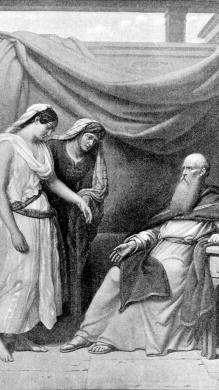 Read the story in Genesis 15–17 now
Read the story in Genesis 15–17 now
Abram is a man in need of an heir. His wife, Sarai, is barren but determined to bear a child for her husband. Offering her servant, Hagar, as a vehicle to produce her child, Abram accepts and “goes into her” (a somewhat crude way to suggest love-making).
The two conceive, but Hagar looks down on Sarai due to her being unable to produce an heir for Abram. Displeased, Sarai deals with Hagar harshly and forces her to flee. God, in the end, rewards Sarah’s actions with fertility and she gives Abram the heir he so desperately sought in Isaac.
Sarah’s love for Abram was so strong that she was willing to see him have a child with another woman to please him – having a surrogate mother was equally as acceptable to her as having her own child with Abram. Understandably though became jealous of Hagar. This is surely a story that shows us that love makes us do some silly things to please the person that we love.
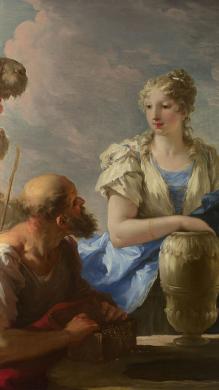 Read the story in Genesis 24 now
Read the story in Genesis 24 now
After the death of his wife, and seeing his son alone, Abram orders one of his servants to go and obtain a wife for his son from another town, so that Isaac isn’t forced to go with a Canaanite girl. Armed with expensive jewellery, the servant finds Rebekah, whose appearance was prophesised by God (added to the fact that she offers the servant and his camels some water), and requests she join him in becoming Isaac’s new wife.
As they arrive back, Rebekah catches a glimpse of Isaac praying, and covers herself in a veil. Isaac brings Rebekah immediately into the tent where his mother, Sarai, died and marries her. As Rebekah entered the tent, miracles that were apparent when Sarai lived (and departed when she died) reappeared.
It seems that Isaac was in desperate need of a woman figure in his life; especially once his mother had died. Rebekah, similarly God-sent, was seemingly the perfect substitute – seen through the re-emergence of the miracles that were present when Sarah lived. Every man needs a woman in his life to keep him on the straight and narrow, be it his mother or partner – Isaac found his replacement. Or was it possible that he just needed someone to help him get over his mother’s death?
 Read the story in Genesis 29 now
Read the story in Genesis 29 now
This is a tricky one…
Jacob, son of Rebecca, was sent to take solace and find a wife with his Uncle Laban in a distant land. Here, he met his cousin Rachel who he considered beautiful in form and appearance. Such was his love for Rachel that he pledged to work for his Uncle Laban for seven years in return for her hand in marriage, but this labour felt like days to him such was his love for his cousin Rachel – the soppy blighter!
After seven years of hard labour, the day came when he could finally marry the love of his life, Rachel. With the bride concealed under a veil, the wedding went without a problem and the marriage was consecrated that night! The following morning, however, wasn’t quite as good. It turns out Laban had actually put ‘tender eyes’ Leah under the veil and deceived Jacob because, apparently, it should always be the older child that marries first. Jacob was rightly angry, and vowed that after his wedding week was finished, he’d take Rachel for his wife as well! (Although he did have to work a further seven years…)
After that, it became like a competition for the two sisters to see who could give Jacob the most children – Leah taking the lead by giving Jacob four boys. The sisters even threw their respective servants at Jacob to up their tally (surrogates were well within the rules). In the end, God blessed Rachel and she produced Joseph, who became Jacob’s favourite. One nil to Rachel, I say.
Although the story is relatively complicated, the message is clear: work for the one you want, and in the end you’ll be rewarded with something incredible.
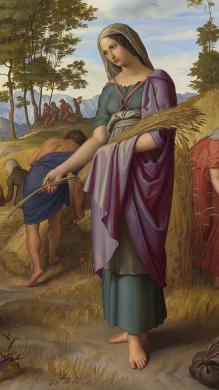 Read the story in Ruth 1–4 now
Read the story in Ruth 1–4 now
Ruth, a widow and full-time carer of her mother-in-law, Naomi, took up work with Naomi’s relative, Boaz. Ruth providing for the mother of her deceased husband was seen as a noble by Boaz, and he looked upon her favourably – despite the fact she was a “foreigner”. Boaz cared for Ruth, and sent her to work in a field full of young women to ensure that the young men didn’t assault her.
Ruth sleeps with Boaz (no hanky-panky) and is told that, should she not find a “redeemer” that Boaz himself will “redeem” her (all feels particularly sexual to me…). A potential redeemer comes, but is put off when Boaz tells that Ruth is part of the deal; apparently he was only after the land and not a woman on the side. Therefore, Boaz takes Ruth as his wife and with it inherits her land – thus keeping it in the family.
Boaz has Ruth’s best interests at heart, and does all he can to ensure that she remains safe. Indicating that true love is about protecting, caring and supporting for the one that you love.
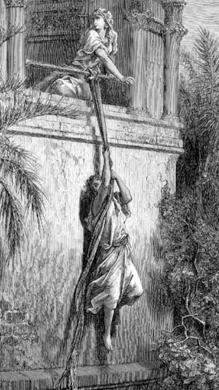 Read the story in 1 Samuel 18–19 now
Read the story in 1 Samuel 18–19 now
Mighty warrior, and slayer of Goliath, David struck fear and jealousy into King Saul – fearing that David’s popularity brought everything, it was only the kingdom that he didn’t possess. Saul grew angrier and angrier with David and briefly toyed with killing him, before his son (and admirer of David) Jonathan, talked Saul out of it. Nevertheless, King Saul was suffering with a case of the green-eyed monster. So he did what we’d all do in that situation and offered David his daughter, Michal, in return for 200 Philistine foreskins - a fair trade, I think we’d all agree.
But this gesture of good will is short-lived, and Saul’s rage grows and he sends for David’s murder. Knowing that this is going to happen, Michal deceives her father and tells the great warrior to flee or die. To ensure her father doesn’t suspect a thing, she pulls the old stuff-a-bed-with-clothes-and-goat-hair-to-make-it-look-as-though-someone-is-there technique – it doesn’t work and Saul sends his troops out to find David and kill him. However, when they find him, they all turn a bit funny.
Well, Michal certainly loved David enough to betray her father, but she was seemingly just a pawn in the two powerhouses game. This almost suggests that romantic love wins out over family love. She put herself at risk to ensure the safety of the man that she loved – in some ways that would be deemed irrational.
David’s at it again! Upon seeing the beautiful Bathsheba, David goes out and gets what he wants. Unfortunately, the beautiful woman was married but that doesn’t stop him, and the two of them perform adulterous acts – naughty. It gets worse, however, when it turns out that Bathsheba is carrying David’s child. In order to try and ensure that no one knows of this naughtiness, David sends for Uriah to return from war so that he may “get into” his wife again and hide the identity of the child’s father (Jeremy Kyle would got to the bottom of it, though). However Uriah refuses, and so David sees that Uriah is killed in battle.
Once Bathsheba had finished her twenty minutes of mourning, her and David got married – much to the disgust of the prophet Nathan. Nathan promised that God would punish them both for their deeds, and lo and behold their child became ill and died very quickly.
Love is shallow. There is very little justification of the love between David and Bathsheba, and in fact is more aimed toward the lust and the adulterous activities between the two. This romance, isn’t particularly romantic.
 Read the story in Judges 16 now
Read the story in Judges 16 now
After being followed to a whorehouse by the Philistines, Samson picks up the gate where they were waiting to ambush him and waltzes off. Shortly after this, he meets, and falls in love with, Delilah (possibly the one that Sir Tom sung about).
Seeing their way in, the Philistines approach Delilah and offer her 1100 silver coins in order to seduce Samson and find out the source of his great strength. She accepts and politely asks where his source of great strength is drawn from (as subtly as that) to which Samson lies a few times, tricking her into thinking his power is diminished if his hair is tied up, or if he is tied up in certain pieces of rope. In the end, Delilah gets annoyed and plays the “If you love me, you’d tell me” card – and like all men before and after him, Samson folds under the pressure and tells his love where the source of his power emanates from. Shortly after, Delilah cuts his hair and the Philistines seize him with ease and take him to become a sort of circus performer. With one final burst of strength, however, Samson manages to pull the building down where he is and kill himself while taking a load of Philistines with him.
Some people will quite happily sell the secrets of their loved ones for money. For some, the love lies with material goods, rather than the person they are sharing love with. The Bible said it, not me.

They say love is what makes the world go round, but what does the Bible have to say about it? Here are the top ten Bible verses tagged with 'love' on our online Bible.

Love books? Love book clubs? Welcome to Bible Book Club, helping you read the Bible with your friends – one book at a time.
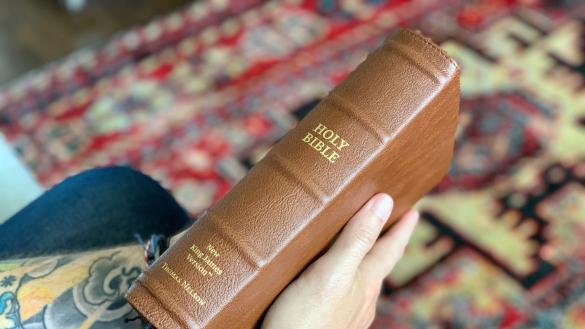
Use our online Bible to read, search, compare, and comment, as well as saving notes and sharing animated verses.
Share this: